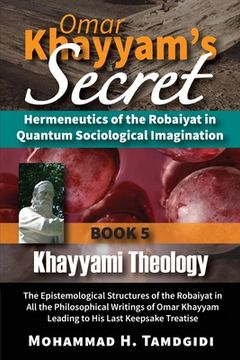Omar Khayyam's Secret: Hermeneutics of the Robaiyat in Quantum Sociological Imagination: Book 5: Khayyami Theology: The Epistemological Struc (en Inglés)
Reseña del libro "Omar Khayyam's Secret: Hermeneutics of the Robaiyat in Quantum Sociological Imagination: Book 5: Khayyami Theology: The Epistemological Struc (en Inglés)"
Omar Khayyam's Secret: Hermeneutics of the Robaiyat in Quantum Sociological Imagination, by Mohammad H. Tamdgidi, is a twelve-book series of which this book is the fifth volume, subtitled Khayyami Theology: The Epistemological Structures of the Robaiyat in All the Philosophical Writings of Omar Khayyam Leading to His Last Keepsake Treatise. Each book, independently readable, can be best understood as a part of the whole series.In Book 5, to understand the theological epistemology (or, way of knowing God) framing Khayyam's Robaiyat as spread out in all his philosophical works, Tamdgidi further offers the texts and his updated Persian and new English translations and analyses of six primary writings that preceded Khayyam's last keepsake treatise on the universals of existence: 1: Khayyam's annotated Persian translation of Avicenna's sermon in Arabic on God and creation; 2: Khayyam's treatise in Arabic addressed to Nasawi (wrongly regarded as an Avicenna pupil) on the created world and worship duty; 3-5: Khayyam's three treatises in Arabic (all addressed to Abu Taher, to whom Khayyam also dedicated his treatise on algebra) that are separate chapters of a three-part treatise on existence on topics ranging from the necessity of contradiction, determinism, survival, attributes of existents, and the light of intellect on 'existent' as the subject matter of universal science; and 6: Khayyam's treatise in Arabic addressed to Moshkavi (a supportive Shia intellectual) in response to three questions on soul's survival, on the necessity of accidents, and on the nature of time. The most fruitful way of understanding Khayyam's six texts is by regarding them as efforts made at defending his "succession order" thesis implicitly revealed when commenting on Avicenna's sermon and finalized in his last keepsake treatise. The texts served to offer the theological epistemology behind Khayyam's thesis, revealing his creative conceptualist view of existence that informed his poetic way of going about knowing God, creation, and himself within a unitary Islamic creationist-evolutionary worldview. Khayyam's way of knowing God and existence is non-dualistic, non-atomistic, and unitary in worldview, allowing for subject-included objectivity, probabilistic determinism, transcontinuous (or 'discontinuous') creative causality, transdisciplinarity, and transculturalism; it thus fulfils in a prescient way all the eight attributes of the quantum vision. Poetry is most conducive to unitary knowing, and subject-included objectivity must necessarily be self-reflective and thus engage intellective, emotional, and sensible modes of knowing. This explains why Khayyam transcended scholastic learning in favor of a poetic encounter with reality. What he meant by 'Drunkenness, ' calling it the highest state of mind known to him, can thus be best understood as a unitary, quantum state of mind achieved by way of his poetry as a meditative art of self-purification. The goal, metaphorically, is to move from a way of knowing things as divisible grapes to a pure and unitary way of knowing them as indivisible Wine -- paralleling what we call today moving from chunky Newtonian toward unitary quantum visions of reality.The key for entering Khayyam's secret tent is realizing that what he primarily meant by 'Wine' in his Robaiyat was self-referentially his Robaiyat itself, a key openly hidden therein thanks to his theological epistemology. For him, the Robaiyat was a lifelong work on himself, serving also human spiritual awakening to its place and duty in the succession order of God's creation. It also served his aspiration for a lasting soul. He knew the now-proven worth of his secret magnum opus, and that is why he so much praised his 'Wine.'

